Autism awareness has successfully brought the autism spectrum into public conversation. However, awareness is just the first step. For meaningful change to occur, that recognition must translate into tangible support. When you donate to reputable nonprofit organizations dedicated to the autism community, your money moves beyond awareness to actively fund critical resources that enhance education and strengthen community care.
These contributions are vital investments in the future, providing necessary tools and training to empower individuals on the spectrum and the people who support them. Here are five significant ways your donation advances autism education and community care.
Your Donation Funds Specialized Educational Programs
One of the most pressing needs within the autism community is access to educational settings tailored to unique learning styles. Many public school systems lack the resources, small class sizes, and specialist training required to meet these needs effectively. Your donation directly funds specialized educational programs and training initiatives within nonprofits.
These funds support the development of individualized curricula, sensory-friendly classrooms, and the implementation of evidence-based teaching strategies like Applied Behavior Analysis (ABA) or other structured teaching methods. By underwriting the high cost of these intensive programs, your contribution helps students on the spectrum acquire essential academic, communication, and social skills, setting them up for greater independence and success later in life.
Your Donation Supports Comprehensive Family and Caregiver Training
Raising or caring for an individual on the autism spectrum often presents unique challenges that require specific skills and coping strategies. Isolation and a lack of resources can be overwhelming for families and professional caregivers. Donations are critical in providing comprehensive family and caregiver training programs.
These programs offer workshops, webinars, and peer support groups that educate parents and guardians on behavior management techniques, effective communication strategies, and navigating complex systems like healthcare and educational services. By equipping caregivers with practical tools and emotional support, these donations strengthen the family unit, reduce stress, and ensure a more consistent, nurturing, and informed home environment for the individual on the spectrum.
Your Donation Develops Crucial Job and Life Skills Training
Achieving independence as an adult requires practical vocational and daily life skills. Unemployment rates for adults on the autism spectrum remain disproportionately high, often due to a lack of targeted transitional support. Charitable contributions fuel programs that focus on developing crucial job and life skills training.
These initiatives include vocational assessments, résumé building, interview practice, and supported employment programs that match individuals with jobs where they can thrive. Furthermore, funding supports training in essential life skills, such as money management, public transportation use, and cooking. By bridging the gap between education and employment, your donation helps adults on the spectrum gain financial autonomy and meaningful inclusion in the workforce.
Your Donation Facilitates Accessible Community Inclusion Activities
True community care means fostering environments where individuals on the spectrum can participate safely and comfortably. Many common public activities—from trips to the museum to sports leagues—can be inaccessible due to sensory overload or a lack of understanding from organizers. Your support facilitates accessible community inclusion activities.
Nonprofits use these funds to create sensory-friendly events (like quiet movie screenings or designated library hours), adaptive sports programs, and social skills groups. They also work with local businesses to provide training on welcoming and accommodating individuals with different needs. This financial support helps dismantle social barriers, combating isolation and creating opportunities for authentic engagement and integration within the broader community.
Your Donation Expands Advocacy and Public Policy Efforts
To ensure sustainable, long-term support for the autism community, systemic change is necessary. Donations play a fundamental role in funding advocacy and public policy efforts at local, state, and national levels.
These funds support research into best practices, the creation of position papers, and direct lobbying to influence legislation related to healthcare coverage, housing, employment anti-discrimination laws, and funding for public services. By supporting advocacy, your contribution helps secure essential legal and financial protections that impact thousands of lives, ensuring that future generations of individuals on the spectrum have better access to quality services and equitable opportunities.
Final Thoughts
Donating to organizations dedicated to autism like Generation Kadima is a high-impact way to move past simple awareness and into meaningful action. These funds are the operational backbone for specialized education, vital family support, critical job training, essential community inclusion, and powerful policy advocacy. By making a thoughtful contribution, you are directly investing in the potential and well-being of individuals on the autism spectrum, helping to build a more inclusive, educated, and supportive society for everyone.


